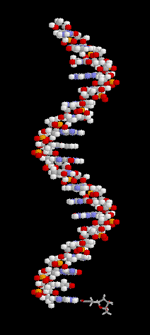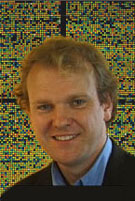
We received so many letters and e-mails about the Human Genome Project that we decided to interview our Starlab experts in full about the news released on Monday 26th June.
THE HUMAN GENOME
Starlab,
the interdisciplinary research institute where Shebang is published, is
currently establishing an Ethics Department.
Based on your letters and discussions at the institute and in the media,
the following main issues have been identified as being crucially relevant
to the ethics of genetics research.
First,
the problem of information access and privacy, with particular attention
to the large data banks and search companies that raise important questions
about control of information.
Second, the issue of exclusionary practices affecting individuals perceived
to be at special risk and the impact of social stratification by race
and ethnicity, gender, and social class on genetic information.
Third, the pitfalls of screening for susceptibility as opposed to monitoring
for environmental hazards.
Fourth, drug screening information as a model to avoid for the use of
screening technologies.
Fifth, implications of fetal exclusion policies as precedent for the applications
of genetic information, especially the ways in which
employers require individuals and their private doctors to assume responsibility
for risk.
Finally, the rational and fair management of genetic innovation, with
attention to ownership rights, confidentiality, and equity.
Dr. Christophe
Van Huffel: Well, yes, yesterday was a great day, I think, for geneticists
like me. We've been waiting for more than fifteen years for these very
short stretches of letters from the genetic code, and working long hours
on this, for all that time it seemed incredible that one day we could
- and so fast - have the entire Genome sequence.
Although it was certainly something that would have to be done one day,
it's still hard for me to realise that this has happened so soon, and
that it opens so many new possibilities in the field, which I am excited
about. I realise now that it doesn't mean so much in terms of how we understand
biology. It's just the initial building block, with which we can now work
to begin to understand some of the logic, if not all the logic
of Life.
Now some of the questions may be much broader than they used to be.
We can already do some very weird things in biology without really knowing
what's going on. We can clone Dolly. We can do things that seem incredible
without even knowing a single gene or that 2 or 3 genes are important
in that operation.
We can achieve such things, because we can play with the context of biology.
We rely on the complexity of biology, we rely on its functioning without
really understanding it. And that's how we have been going through life,
so far.
Shebang:
What's it going to mean to people in the street, the average person?
Van Huffel: Immediately,
or in the short term, I don't think it's going to mean that much. Not
even in the next year. But it will lead a lot of places: companies and
academic institutions are working - we are ourselves at Starlab are working
in the direction of customised medicine.
Let me put it this way: you and I look different. We have a pool of 50-
to 100,000 genes. And people are able to distinguish us, based on our
looks, on different characteristics, qualities that make us who we are.
But with drugs, the doctors prescribe the same drugs, the same doses
of drugs to each of us.
But drugs work within each of us differently. Drugs
'see' each of us differently.
By understanding the genes of each individual, and how they are configured,
we will be able to understand better how to stratify people and populations.
We will be able to adjust the dose or even the kind of drug that we give
to similar disease cases but with different genetic backgrounds. I think
that will lead to more powerful medicine, more versatile medicine.
For instance, in the case of tumours, which are evolving genetic materials
in a sense, doctors will be able to adjust the treatments constantly as
the disease progresses - hoping that it doesn't progress too much. The
therapy, the cocktail will be adjusted as the disease develops, or regresses,
we hope. That is one of the direct consequences of this big new development
yesterday.
In fact it will be the first consequence, probably, because it will take
place in the diagnostic field and there are less administrative hurdles
before we can reach those applications, while in the case of drug development,
there are longer timelines to get compliance, for instance in America,
for the release of new drugs on the market.
5-10
Years
However in the 5-10
year period from now, this technology - I am talking of the genome as
a technology, it's still science, but it's going to become technology,
even engineering - this technology is going to allow us to reconsider
the strategies of controlling diseases.
With drugs, for instance: drugs have a tradition, there is the tradition
of an industry around them, but maybe drugs may look very barbaric when
we look back at our medicine 10 years, 50 years from now.
And maybe we'll have the tools to effect some kind of correction: we may
be able to develop some gene therapies to correct mutations in individuals.

